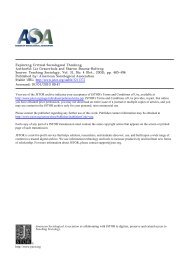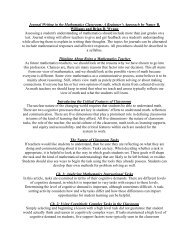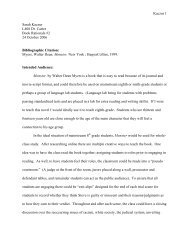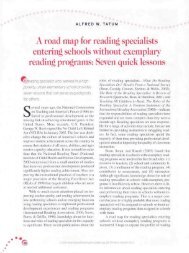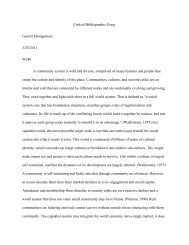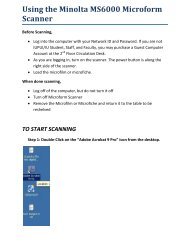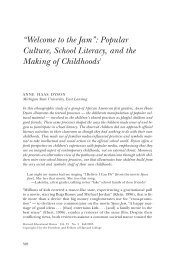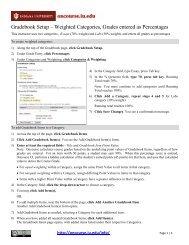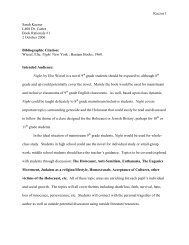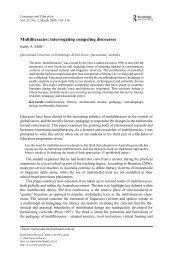Rose 2005 Pragmatics Synthesis.pdf - Oncourse
Rose 2005 Pragmatics Synthesis.pdf - Oncourse
Rose 2005 Pragmatics Synthesis.pdf - Oncourse
You also want an ePaper? Increase the reach of your titles
YUMPU automatically turns print PDFs into web optimized ePapers that Google loves.
396 K.R. <strong>Rose</strong> / System 33 (<strong>2005</strong>) 385–399<br />
that the students in the implicit group had more out-of-class contact with native<br />
speakers of Japanese, an obvious threat to internal validity, and a clear reminder<br />
of the importance of collecting as much information as possible on learnersÕ exposure<br />
to the target language outside of the classroom.<br />
In addition to studies which produced inconclusive results, there were also cases in<br />
which certain aspects of the target language proved resistant to instruction. House<br />
(1996) found that even though learners in her explicit group had made considerable<br />
progress in incorporating pragmatic routines and discourse strategies into role-play<br />
interaction, they continued to evidence negative transfer from German, for example,<br />
in reliance on content-oriented and self-referenced gambits instead of interpersonal<br />
gambits, overuse of yes in various interactional slots surrounding turn-taking, and<br />
especially problems in producing well-aligned responding turns. These lingering problems<br />
are reminiscent of those noted by Liddicoat and Crozet (2001) and Yoshimi<br />
(2001), both of whom also found that learners had difficulty incorporating some target<br />
features into online interaction. Once again, the explanation for these problems is<br />
likely to be limitations in control of processing (Bialystok, 1993). Takahashi (2001)<br />
also found that participantsÕ use of I wonder if you could VP predominated across<br />
all situations, regardless of degree of imposition, providing no evidence of development<br />
in terms of sociopragmatic proficiency. The fact that even her explicit learners<br />
– who clearly benefited from the instruction in terms of frequency of use – still did not<br />
differentiate request forms appropriately across contexts is likely another indicator of<br />
the difficulty of learning sociopragmatics, especially in a foreign language context.<br />
Perhaps metapragmatic discussion on the use of the target request forms in context<br />
would be more effective for learning sociopragmatic distinctions than the teacherfronted<br />
approach used for the explicit group, but that is an empirical question. It is<br />
fair to say, however, that studies comparing different instructional approaches – despite<br />
some seemingly contradictory findings – provide considerable support for the<br />
value of explicit instruction (and thus the noticing hypothesis). In most cases where<br />
there was not some apparent methodological (or other) flaw, learners who had been<br />
provided with metapragmatic information regarding the target feature(s) outperformed<br />
those who did not. Of course, certain areas remained difficult for all learners,<br />
particularly where online use of the target features in interaction was concerned.<br />
Sociopragmatics was also frequently an area of difficulty, although there is evidence<br />
that better results are produced with metapragmatic discussion than without (<strong>Rose</strong><br />
and Ng, 2001).<br />
5. Conclusion<br />
Based on results from the studies carried out to date, it is possible to come to some<br />
tentative conclusions regarding the effects of instruction in second language pragmatics.<br />
First, there is considerable evidence indicating that a range of features of second<br />
language pragmatics are teachable. These include a variety of discoursal, pragmatic,<br />
and sociolinguistic targets of instruction, such as discourse markers and strategies,<br />
pragmatic routines, speech acts, overall discourse characteristics, and pragmatic com-



